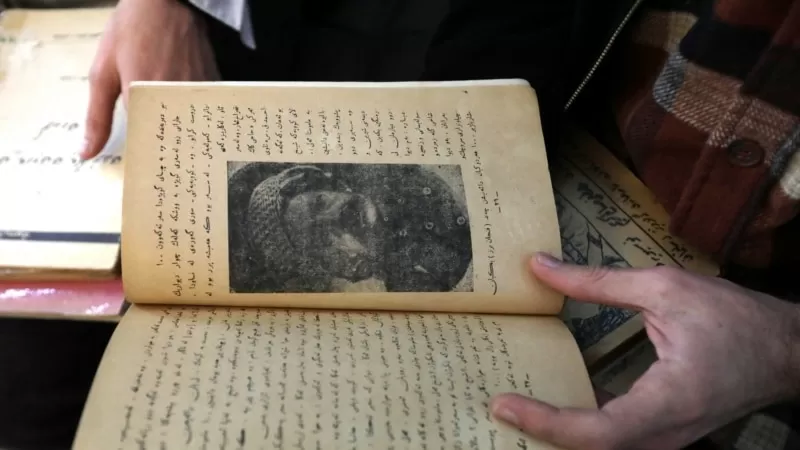Dohuk, Iraq – Nestled in the back of a van, Rebin Pishtiwan carefully flips through yellowed pages, on a mission to digitize historic Kurdish books at risk of disappearing.
The Kurds, known as the world’s largest stateless people, are an ethnic group of 25 to 35 million spread across modern-day Iraq, Iran, Syria, and Turkey. In Iraq, they are a significant minority who have faced persecution and oppression, resulting in the loss or destruction of many of their historic documents.
For Pishtiwan, preserving the culture and history of Kurdistan is a sacred duty. He and his two colleagues travel in a small white van once a week from the regional capital Irbil to various Kurdish towns and cities, in search of rare and old books.
Their goal is to digitize these valuable texts, spanning centuries and dialects, to ensure that they do not vanish. In Dohuk’s public library, the team scours the wooden bookshelves for hidden gems with the help of the library’s manager.
Together, they carefully gather an assortment of over 35 books, including poetry, politics, language, and history, written in various Kurdish dialects and some in Arabic. Pishtiwan holds up a book of old Kurdish folk stories named after the 16th-century Kurdish princess, Xanzad, before gently flipping through the fragile pages of another religious volume, tracing the calligraphy with his fingers.
Equipped with two devices connected to a screen, the team begins the hours-long scanning process in the back of their van before returning the books to the library. This project is part of the Kurdistan Center for Arts and Culture’s (KCAC) efforts to preserve and promote Kurdish heritage.
Founded by the nephew of regional President Nechirvan Barzani, the KCAC is a non-profit organization that launched the digitization project in July. Their aim is to make these valuable texts available to the public for free on their new website, set to launch in April.
So far, the team has archived over 950 items, including a collection of manuscripts from the Kurdish Baban principality in today’s Sulaimaniyah region, dating back to the 1800s. According to KCAC executive director Mohammed Fatih, the goal is to provide primary sources for Kurdish readers and researchers, allowing them to deepen their understanding of their culture and history.
Masoud Khalid, the manager of Dohuk library, has given the KCAC team access to manuscripts and documents that have been gathering dust on the shelves for years. However, the team has faced challenges in securing permission from the owners of some of the documents to digitize them immediately.
Khalid explains that they have books that were printed a long time ago, and their owners or writers have passed away. Publishing houses are not reprinting them, making digitization crucial for preserving these valuable texts. He adds that digitizing the collection means that they will be ready to open an electronic library in the future.
The KCAC team also uncovered a treasure at a mosque in the town of Hiran, thanks to Imam Hana Kaki Hirane. He revealed several generations-old manuscripts from a religious school established in the 1700s. The school has been collecting manuscripts since its founding, but many were destroyed during the first war between the Kurds and the Iraqi state between 1961 and 1970.
According to Hirane, only 20 manuscripts remain today, including centuries-old poems. He is eagerly waiting for the launch of the KCAC website in April to refer people to view these valuable documents. He believes that it is time to take them out and make them available to everyone.
The digitization of these historic Kurdish books is not just about preserving the past; it is also about shaping the future. By making these texts accessible to the public, the KCAC hopes to advance the understanding of Kurdish culture and history, and ultimately, strengthen the identity of the Kurdish people.
In a region where the Kurdish language and culture have been marginalized for decades, this project serves as a beacon of hope for the preservation and promotion of Kurdish heritage. It is a reminder that despite the challenges faced by the Kurdish people, their rich history and culture will continue to thrive and be celebrated for generations to come.









